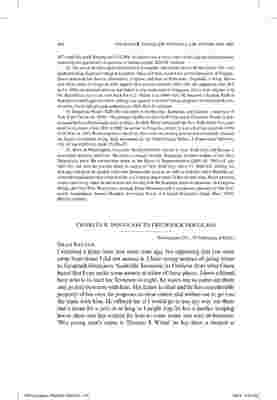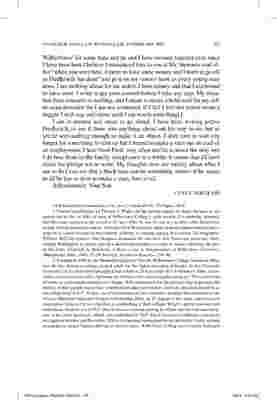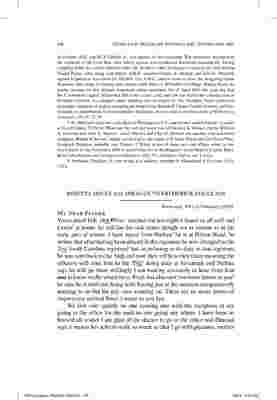Pages
1
CHARLES R. DOUGLASS TO FREDERICK DOUGLASS
Washington, D.C., 19 February 1865
DEAR FATHER
I received a letter from you some time ago, but supposing that you were away from home I did not answer it. I have strong notions of going either to Savannah Georgia or Nashville Tennesee, as I believe from what I have heard that I can make some money at either of these places. I have a friend here who is to start for Tennesee tonight; he wants me to come out there and go into business with him. His father is dead and he has considerable property of his own, he proposes to raise cotton and wishes me to go into the trade with him. He offered me if I would go to pay my way out there and a home for a year or as long as I might stay. He has a mother keeping house there and has written for him to come home and start in business. This young man’s name is Thomas J. White1Precise identification of Thomas J. White and his mother cannot be made, because of the destruction by fire, in 1865, of most of Wilberforce College’s early records. It is probable, however, that like many students at the school in the late 1850s, he was the son of a wealthy white Southerner and an African American woman. After the Civil War started, many of these students were forced to drop out of school because of their fathers’ inability to continue paying their tuition. The biographer William McFeely believes that Douglass dissuaded his son from this Tennessee adventure while visiting Washington to attend Lincoln’s second inauguration a couple of weeks following the date of this letter. Frederick A. McGinnis, A History and an Interpretation of Wilberforce University (Blanchester, Ohio, 1941), 37-39; McFeely, Frederick Douglass, 239-40. he has been a student at
2
Wilberforce2Founded in 1856 by the Methodist Episcopal Church, Wilberforce College, located in Ohio, was the first American college created solely for the higher education of blacks. At the Cincinnati Conference of the Methodist Episcopal Church held on 28 September 1853 in Hillsboro, Ohio, a committee of seven was elected to “promote the welfare of the colored people among us.” This committee of seven, at a subsequent meeting on 9 August 1854, determined that the primary way to promote the welfare of their people was to have qualified and educated teachers, and that education should be at the college level. John F. Wright, one of the members of the committee, attended the conference of the African Methodist Episcopal Church in Columbus, Ohio, on 22 August of the same year to discuss cooperation between the two churches in establishing a black college. Wright’s appeal was met with enthusiasm; however, the A.M.E. church chose to continue putting its efforts into the continued progress of its Union Seminary, which was established in 1847. The Cincinnati Conference committee met again in October and December 1855 to discuss purchasing land for the university, finally settling on a property named Tawawa Springs in Green County. Wilberforce College was formally dedicated in October 1856, and M. P. Gaddis, Jr., was elected its first president. The university thrived until the outbreak of the Civil War, after which income and enrollment decreased dramatically. Facing crippling debts, the school closed in 1862. On 10 March 1863, the board of trustees met with Bishop Daniel Payne, who, along with fellow A.M.E. members James A. Shorter and John G. Mitchell, agreed to purchase the school for $10,000. The A.M.E. church chose to close the struggling Union Seminary and merge its faculty and students with those of Wilberforce College; Bishop Payne, its leader, became the first African American college president. On 14 April 1865, the same day that the Confederate capital, Richmond, fell to the Union army, and one day before the assassination of President Lincoln, the campus’s main building was destroyed by fire. President Payne petitioned prominent members of society, including the benefactors Salmon P. Chase, Charles Sumner, and Gerrit Smith, to contribute to its reconstruction. McGinnis, History and an Interpretation of Wilberforce University, 28-35, 37-39. for some time and he and I have roomed together ever since I have been here I believe I introduced him to you at Mr. Stewarts coal office3In 1864 there were two coal offices in Washington, D.C., run by men named Stewart. Located at Canal Corner, 7th Street West was the coal and wood firm of Fenwick & Stewart, run by William A. Fenwick and John A. Stewart. James Warder and Clay H. Stewart ran another coal and wood company, Warder & Stewart, which was located at the corner of H Street North and 12th Street West. Frederick Douglass probably met Thomas J. White at one of these two coal offices when he visited Charles in late November 1864 to attend a lecture at Washington’s Israel Baptist Church. Boyd, Boyd’s Washington and Georgetown Directory, 150, 271; Douglass Papers, ser. 1, 4:x1x. when you were here. I mean to have some money and I want to go off as Fred[eric]k has done4Frederick Douglass, Jr., was acting as a military recruiter in Mississippi at this time. EAA, 1:422. and go it on my own; hook as every young man does, I see nothing ahead for me unless I have money and that Iam bound to have soon. I write to get your consent before I take any step. My situation here amounts to nothing, and I mean to make a bold start for my self in some direction for I am not contented. If I fail I will not return home a beggar I will stay and strive until J am worth something[.]
I am in earnest and mean to go ahead. I have been writing t Fred[eric]k to see if there was anything ahead out his way to do. but as yet he sees nothing enough to make it an object. I dont care to wait any longer for something to turn up but I intend to make a start out on trail of an employment. I hear from Fred. very often and he is about the only one I do hear from in the family except once in a while. It seems that all have taken the pledge not to write. My thoughts now are mostly about what I am to do I can see that a black man can be something now; if he wants to all he has to do 1s to make a start, love to all.
Affectionately Your Son.
CHAS R. DOUGLASS
ALS: General Correspondence File, reel 2, frames 90-91, FD Papers, DLC.


